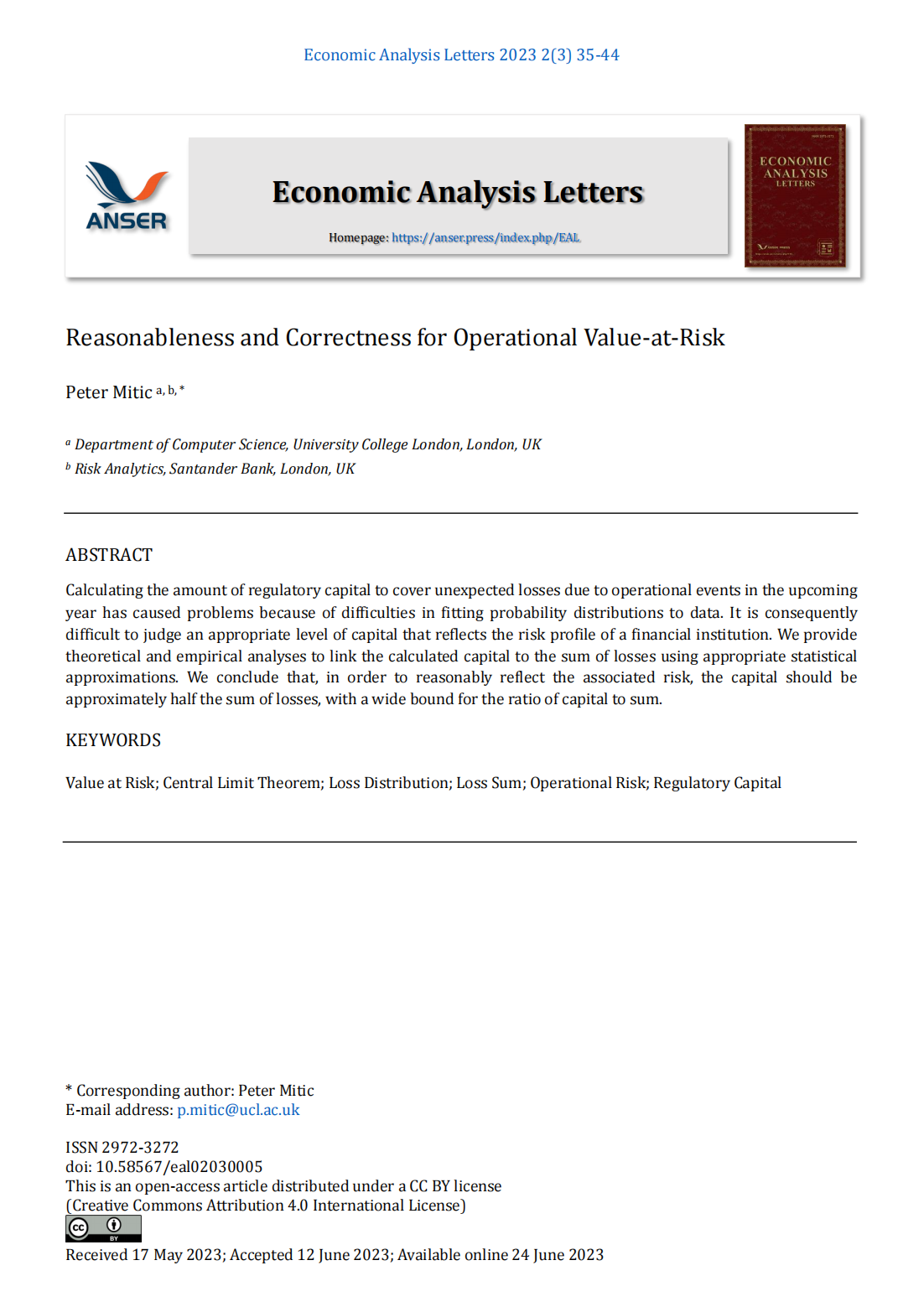Reasonableness and Correctness for Operational Value-at-Risk
DOI:
https://doi.org/10.58567/eal02030005Keywords:
Value at Risk; Central Limit Theorem; Loss Distribution; Loss Sum; Operational Risk; Regulatory CapitalAbstract
Calculating the amount of regulatory capital to cover unexpected losses due to operational events in the upcoming year has caused problems because of difficulties in fitting probability distributions to data. It is consequently difficult to judge an appropriate level of capital that reflects the risk profile of a financial institution. We provide theoretical and empirical analyses to link the calculated capital to the sum of losses using appropriate statistical approximations. We conclude that, in order to reasonably reflect the associated risk, the capital should be approximately half the sum of losses, with a wide bound for the ratio of capital to sum.
References
Abdymomunov, A. and Curti, F. (2020). Quantifying and stress testing operational risk with peer banks’ data. Journal of Financial Services Research, 57, 287-313. https://doi.org/10.1007/s10693-019-00320-w
Abdymomunov, A., Curti, F., and Mihov, A. (2020). U.S. banking sector operational losses and the macroeconomic environment. Journal of Money, Credit, and Banking, 52(1), 115–144. https://doi.org/10.1111/jmcb.12661
Berkowitz, J. and O’Brian, J. (2002). How accurate are value-at-risk models at commercial banks? Journal of Finance, 57(3), 1093–1111. https://doi.org/10.1111/1540-6261.00455
BIS (2006). Bank for International Settlements BCBS128 - International Convergence of Capital Measurement and Capital Standards. https://www.bis.org/publ/bcbs128.htm
Chen,Q. and Wen,Y. (2010). A BP-Neural Network Predictor Model for Operational Risk Losses of Commercial Bank. 3rd Int. Symposium on Information Processing, Qingdao, 291-295. https://doi.org/10.1109/ISIP.2010.43
Efron, B and Tibshirani, R.J. (1994) An Introduction to the Bootstrap, Chapman Hall
Frachot, A., Georges, P., and Roncalli, T. (2001). Loss distribution approach for operational risk. Working paper, Groupe de Recherche Operationnelle, Credit Lyonnais, France. http://ssrn.com/abstract=1032523
Mitic, P., Cooper, J. and Bloxham, N. (2020). Incremental Value-at-Risk. Journal of Model Risk Validation, 14(1), 1-37. https://doi.org/10.21314/JRMV.2020.216
Mitic, P. (2015). Improved Goodness-of-Fit tests for Operational Risk. Journal of Operational Risk, 15(1), 77-126. https://doi.org/10.21314/JOP.2015.159
Mitic, P. (2023). Credible Value-at-Risk. Submitted to the Journal of Operational Risk
Pena,A., Patino, A., Chiclana, F., Caraffini, F. and Congora, M. (2021). Fuzzy convolutional deep-learning model to estimate the operational risk capital using multi-source risk events. Applied Soft Computing 107(107381). https://www.sciencedirect.com/science/article/pii/S1568494621003045
Stuart, R. (2023) Why did Credit Suisse fail? Economics Observatory https://www.economicsobservatory.com/
Weisstein, E. W. (2023) Wolfram MathWorld. https://mathworld.wolfram.com

Downloads
Published
How to Cite
Issue
Section
License
Copyright (c) 2023 Peter Mitic

This work is licensed under a Creative Commons Attribution 4.0 International License.